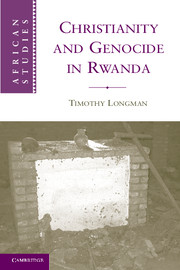Book contents
- Frontmatter
- Contents
- Acknowledgments
- Christianity and Genocide in Rwanda
- INTRODUCTION
- PART I “RIVER OF BLOOD”: RWANDA'S NATIONAL CHURCHES AND THE 1994 GENOCIDE
- PART II “GOD HAS HIDDEN HIS FACE”: LOCAL CHURCHES AND THE EXERCISE OF POWER IN RWANDA
- CONCLUSION
- 10 Churches and Accounting for Genocide
- Bibliography
- Index
- Titles in the series
10 - Churches and Accounting for Genocide
Published online by Cambridge University Press: 03 May 2010
- Frontmatter
- Contents
- Acknowledgments
- Christianity and Genocide in Rwanda
- INTRODUCTION
- PART I “RIVER OF BLOOD”: RWANDA'S NATIONAL CHURCHES AND THE 1994 GENOCIDE
- PART II “GOD HAS HIDDEN HIS FACE”: LOCAL CHURCHES AND THE EXERCISE OF POWER IN RWANDA
- CONCLUSION
- 10 Churches and Accounting for Genocide
- Bibliography
- Index
- Titles in the series
Summary
In the half century since the systematic massacre of Jews in Europe under Nazi rule, the idea of the uniqueness of the Holocaust has become an important subject of debate. Many scholars, activists, and survivors feel that the Holocaust was such a cataclysmic event of such profound significance that it cannot be compared to other historical events without insulting the memory of those who died. As Elie Wiesel has claimed, “The Event remains unique, unlike any other product of history, it transcends history.” In other words, the Holocaust was so terrible that it surpasses human capacity for explanation.
A similar sentiment has emerged in the aftermath of Rwanda's 1994 genocide. During my work for Human Rights Watch in 1995-96 in which I helped investigate the causes and methods of the genocide, I encountered many Rwandans who claimed that the massacre of Tutsi was so extreme and so terrible as to exceed human capacity for explanation.
As Catholic lay leader Laurient Ntezimana demanded in the documentary A Republic Gone Mad:
Is it possible to explain such things? Is it possible to explain? How can you explain a horror like Auschwitz? Is it possible? I don't think so. Sometimes things surpass human reason. Things descended to the depths of the utterly unimaginable. Unimaginable. You can understand the wickedness but not something so dreadful and so long, because it lasted three months. In the end, everyone allowed themselves to be carried along. […]
- Type
- Chapter
- Information
- Christianity and Genocide in Rwanda , pp. 303 - 324Publisher: Cambridge University PressPrint publication year: 2009



